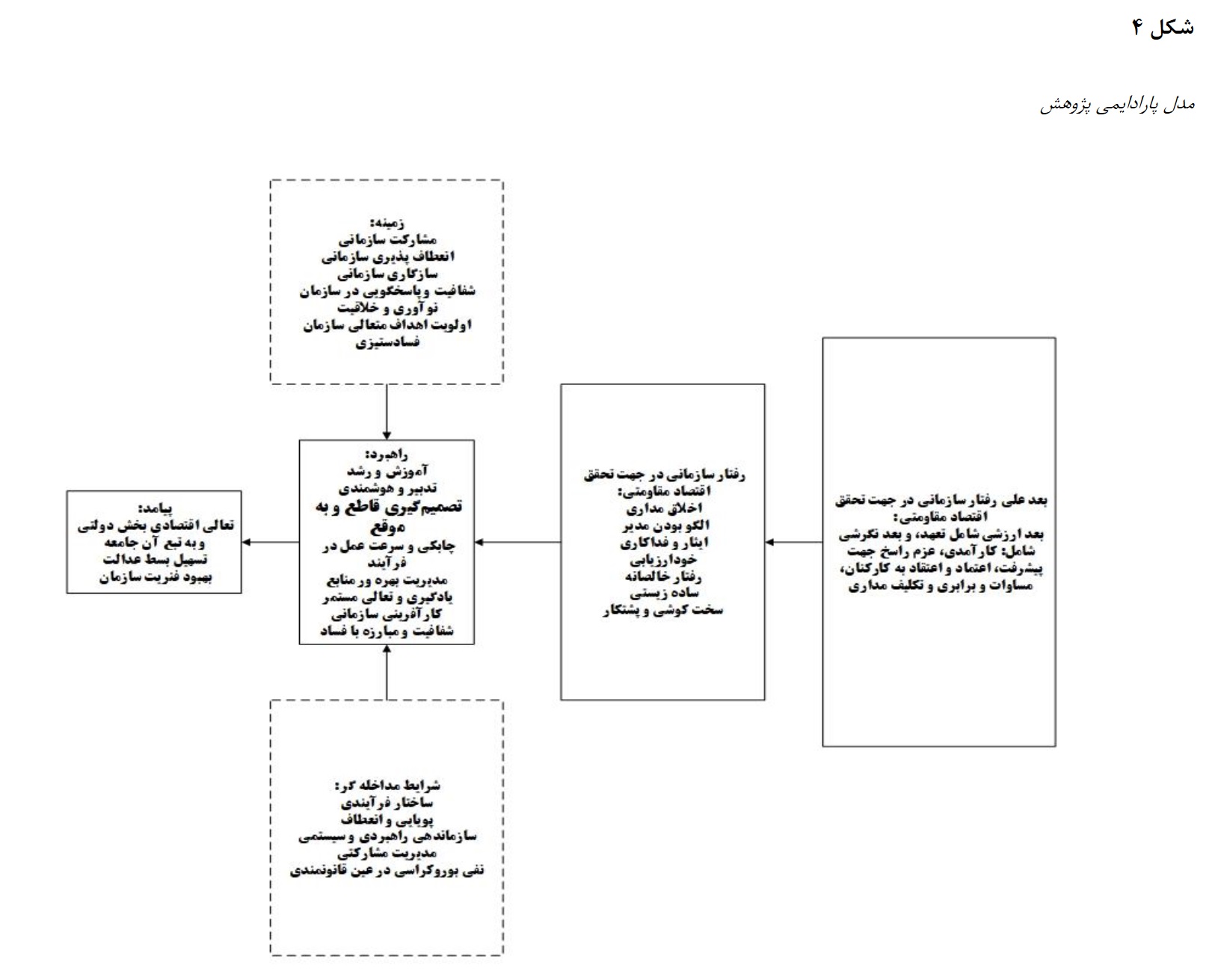Presentation of a Model for Achieving the Goals of the Resistance Economy through Ideal Individual Behavior of Employees in Government Organizations with a Qualitative Approach
Keywords:
Organizational Behavior, Resistance Economy, Individual Behaviors, Grounded TheoryAbstract
The achievement of the distinct and superior goals of the Islamic Revolution, in the face of global arrogance and economic pressures, as well as in line with the growth and perfection of all societal members and the expansion of justice, depends on the use of an appropriate economic model. The model introduced in the current situation of the country by the Supreme Leader is the Resistance Economy model. Undoubtedly, the implementation of the Resistance Economy model necessitates the formation of suitable human and social capital, an appropriate environment, and having a behavioral model. Therefore, the present study seeks to provide a model of ideal individual behavior of employees in organizations to achieve the goals of the Resistance Economy using grounded theory. This research is qualitative in philosophy with an inductive approach and exploratory in nature. In this study, the researcher categorized and coded the collected data using the grounded theory method and MAXQDA2018 software. In this research, ten experts (interviewees), who were mostly university professors, executive managers, and experts from government agencies, constituted the research source. The findings of the study indicate that the behavioral model of employees in government organizations to achieve the Resistance Economy model has main dimensions of value, attitude, and behavior at the individual level, and culture, structure, and process at the organizational level, which are divided into sub-categories. Subsequently, according to the obtained results, causal conditions, central category, context, strategy, intervening conditions, and consequences of the behavioral model in achieving the Resistance Economy were extracted using grounded theory.
Downloads
References
Ahmaadzadeh Shahroudi, H., Jamshidian, H., & Shahmohammadi, M. (2022). Demonstrating Resistance Economy using
the Iranian Islamic model of Progress. Defense Economics and Sustainable Development, 7(23), 101-117.
https://eghtesad.sndu.ac.ir/article_1972.html
Fazeli Kebria, H., & Bahmani, A. (2022). Survey the Effect of Social Capital and Cultural Capital on Fulfilling the Goals
of Resistance Economy with Emphasis on the Responsibility of Managers of Knowledge-Based Companies Located
in Mazandaran Science and Technology Park. Interdisciplinary Studies on Strategic Knowledge, 6(22), 7-44.
https://issk.sndu.ac.ir/article_1870.html?lang=en
Pourezzat, A. A., Gholipour, A., & Nadirkhanlou, S. (2009). Representating Barriers to Academic Entrepreneurship and
Knowledge Commercialization at University of Tehran. Journal of Science and Technology Policy, 3(1), 65-77.
https://jstp.nrisp.ac.ir/article_12797.html
https://jstp.nrisp.ac.ir/article_12797_1337e9251eb3833b337f359f252a9d9c.pdf
Salvand, M. (2022). Proposing a Model for Reducing the vulnerability of the Iranian Economy from the Negative Effects
Of The Covid-19 Pandemic. Defense Economics and Sustainable Development, 7(24), 121-147.
https://eghtesad.sndu.ac.ir/article_2251.html
Valle, M. (1999). Crisis, Culture and Charisma: The New Leader's Work in Public Organizations. Public Personnel
Management, 28(2), 245-257. https://doi.org/10.1177/009102609902800206

Downloads
Published
Submitted
Revised
Accepted
Issue
Section
License
Copyright (c) 1403 Journal of Technology in Entrepreneurship and Strategic Management (JTESM)

This work is licensed under a Creative Commons Attribution-NonCommercial 4.0 International License.










